人教版英语初一语法一般现在时
初一英语知识点人教版总结
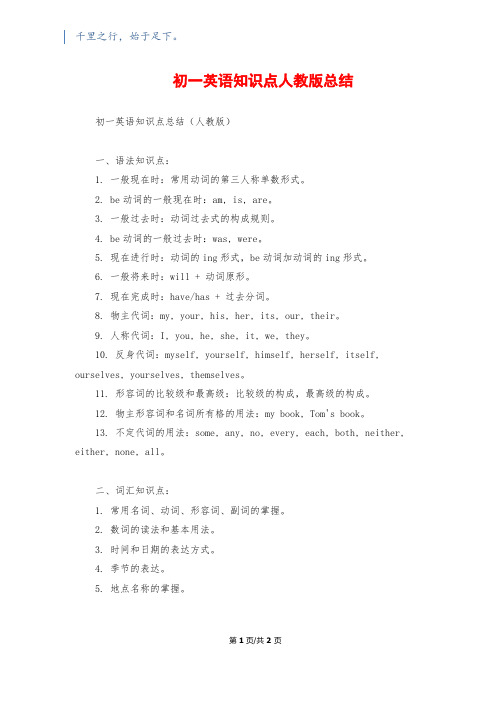
千里之行,始于足下。
初一英语知识点人教版总结初一英语知识点总结(人教版)一、语法知识点:1. 一般现在时:常用动词的第三人称单数形式。
2. be动词的一般现在时:am, is, are。
3. 一般过去时:动词过去式的构成规则。
4. be动词的一般过去时:was, were。
5. 现在进行时:动词的ing形式,be动词加动词的ing形式。
6. 一般将来时:will + 动词原形。
7. 现在完成时:have/has + 过去分词。
8. 物主代词:my, your, his, her, its, our, their。
9. 人称代词:I, you, he, she, it, we, they。
10. 反身代词:myself, yourself, himself, herself, itself, ourselves, yourselves, themselves。
11. 形容词的比较级和最高级:比较级的构成,最高级的构成。
12. 物主形容词和名词所有格的用法:my book, Tom's book。
13. 不定代词的用法:some, any, no, every, each, both, neither, either, none, all。
二、词汇知识点:1. 常用名词、动词、形容词、副词的掌握。
2. 数词的读法和基本用法。
3. 时间和日期的表达方式。
4. 季节的表达。
5. 地点名称的掌握。
第1页/共2页锲而不舍,金石可镂。
三、句型知识点:1. 陈述句的基本句型:主语+谓语+宾语。
2. 疑问句的基本句型:助动词/系动词/情态动词+主语+动词?3. 否定句的基本句型:主语+助动词/be动词/情态动词+not+动词原形。
4. be动词的疑问句和否定句的构成。
5. 以What/Who/Where/When/How开头的特殊疑问句的构成。
四、阅读技巧和写作要点:1. 阅读理解题的解题技巧。
2. 写作要点:选择合适的词汇和句型,注意语法和拼写错误,组织结构和内容的连贯性。
初中英语时态知识点总结人教版
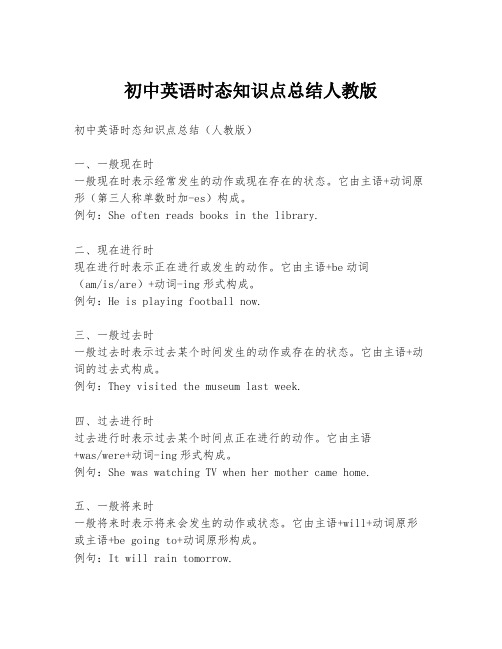
初中英语时态知识点总结人教版初中英语时态知识点总结(人教版)一、一般现在时一般现在时表示经常发生的动作或现在存在的状态。
它由主语+动词原形(第三人称单数时加-es)构成。
例句:She often reads books in the library.二、现在进行时现在进行时表示正在进行或发生的动作。
它由主语+be动词(am/is/are)+动词-ing形式构成。
例句:He is playing football now.三、一般过去时一般过去时表示过去某个时间发生的动作或存在的状态。
它由主语+动词的过去式构成。
例句:They visited the museum last week.四、过去进行时过去进行时表示过去某个时间点正在进行的动作。
它由主语+was/were+动词-ing形式构成。
例句:She was watching TV when her mother came home.五、一般将来时一般将来时表示将来会发生的动作或状态。
它由主语+will+动词原形或主语+be going to+动词原形构成。
例句:It will rain tomorrow.六、将来进行时将来进行时表示将来某个时间点正在进行的动作。
它由主语+will be+动词-ing形式构成。
例句:He will be working at this time tomorrow.七、现在完成时现在完成时表示过去发生的动作对现在造成的影响或结果,或者是从过去开始一直持续到现在的动作。
它由主语+have/has+动词的过去分词构成。
例句:I have finished my homework.八、现在完成进行时现在完成进行时表示从过去某一时间开始,一直持续到现在并可能继续下去的动作。
它由主语+have/has been+动词-ing形式构成。
例句:She has been studying English for five years.九、过去完成时过去完成时表示在过去某个时间点之前已经完成的动作。
人教版初中英语七年级上册语法知识点
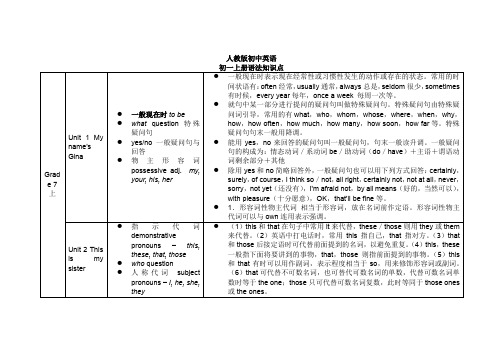
have表示“有”时,其否定形式有两种:在其后直接加not,但常用于非正式用语中;利用助动词do加not。
②如果句子的谓语是实义动词,在谓语动词前加don't,doesn't,didn't。
③no,never,seldom,hardly,nobody,little,few,nothing等否定词也可以构成否定形式。
1.表示经常性或习惯性发生的动作2.表示现在存在的状态或情况3.表示正在发生的动作或存在的状态4.表示客观事实、真理和自然现象5.用于表示较固定的、按计划、规定将要发生的动作,但只限于begin,come,go,leave,arrive,stop,return,close,open,take,start,take,place等少数动作,6.用于if,unless,once,even if(即使)等引导的条件状语从句,when,before,until,as soon as,the moment(一……就)等引导的时间状语从句,no matter+wh-/-how-或wh-ever/however等引导的让步状语从句中,代替一般将来时
人教版初中英语
初一上册语法知识点
Grade 7
上
Unit 1 My name’s Gina
人教版初中英语七年级上册语法知识点总结
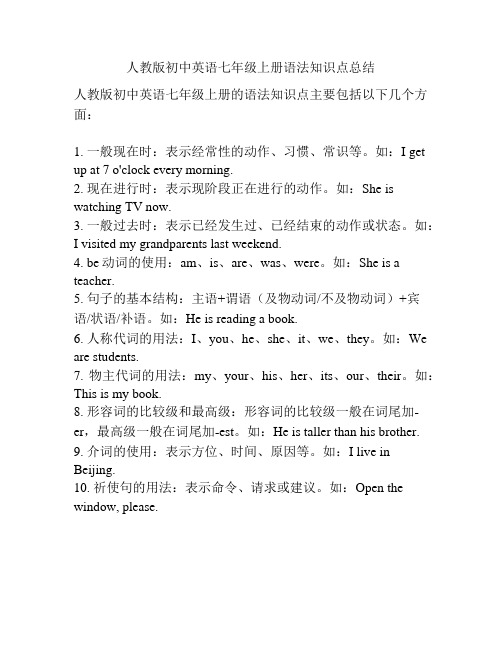
人教版初中英语七年级上册语法知识点总结
人教版初中英语七年级上册的语法知识点主要包括以下几个方面:
1. 一般现在时:表示经常性的动作、习惯、常识等。
如:I get up at 7 o'clock every morning.
2. 现在进行时:表示现阶段正在进行的动作。
如:She is watching TV now.
3. 一般过去时:表示已经发生过、已经结束的动作或状态。
如:
I visited my grandparents last weekend.
4. be动词的使用:am、is、are、was、were。
如:She is a teacher.
5. 句子的基本结构:主语+谓语(及物动词/不及物动词)+宾
语/状语/补语。
如:He is reading a book.
6. 人称代词的用法:I、you、he、she、it、we、they。
如:We are students.
7. 物主代词的用法:my、your、his、her、its、our、their。
如:This is my book.
8. 形容词的比较级和最高级:形容词的比较级一般在词尾加-er,最高级一般在词尾加-est。
如:He is taller than his brother. 9. 介词的使用:表示方位、时间、原因等。
如:I live in Beijing.
10. 祈使句的用法:表示命令、请求或建议。
如:Open the window, please.。
英语七年级下册人教版一般将来时和一般现在时两种时态笔记概念构成动词形式

英语七年级下册人教版一般将来时和一般现在时两种时态笔记概念构成动词形式1.一般现在时(1)结构:当主语是第三人称单数时,谓语动词用第三人称单数形式。
(2)动词的第三人称单数形式变化规则如下:①直接加s。
如:work-works。
②以“辅音字母+y”结尾的词,先变y为i,再加es。
如:carry-carries;cry-cries;try-tries;study一studies。
③以s,x,o,ch,sh结尾的词加es。
如:wash-washes;teach-teaches;go-goes;pass一passes;fix-fixes。
④特殊:have has;am/are is(3)用法:①表示习惯性的动作。
常与seldom,often,usually,always,sometimes,today,every day,once a week,every five minutes,on Sundays等时间状语连用。
如:I go to school at seven every day.我每天七点去上学。
②表示普遍真理和客观事实。
如:The earth goes around the sun.地球绕着太阳转。
③表示在现里所发生的一个动作。
如:Here comes the bus.公共汽车来了。
④在时间和条件状语从句中代替一般将来时。
如:I'll go shopping with my mother if sheis free tomorrow.如果明天我妈妈有空,我将和她去购物。
3.一般将来时(1)结构:助动词shall/will+动词原形;be going to+动词原形(2)用法:①表示将要发生的动作或状态,常用的时间状语有later(on),soon,in a month(in+时间段),next time,from now on,tomorrow等。
如:I shall be eighteen years old next year.明年我就18岁了。
人教版七年级英语上册语法专项_一般现在时
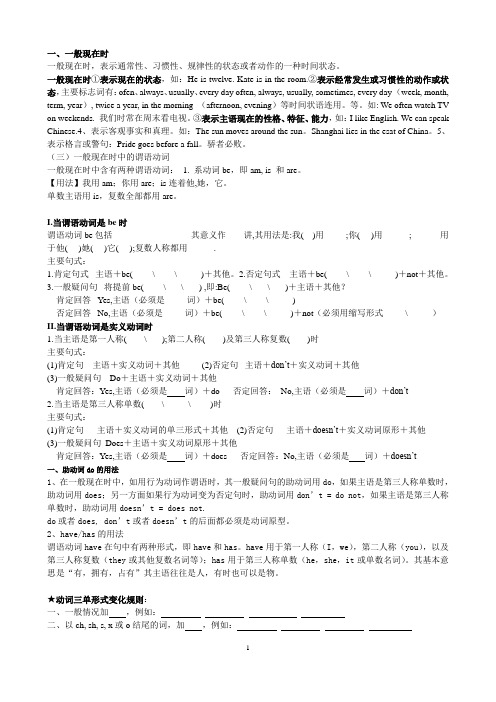
一、一般现在时一般现在时,表示通常性、习惯性、规律性的状态或者动作的一种时间状态。
一般现在时①表示现在的状态,如:He is twelve. Kate is in the room.②表示经常发生或习惯性的动作或状态,主要标志词有:ofen、always、usually、every day often, always, usually, sometimes, every day (week, month, term, year), twice a year, in the morning (afternoon, evening)等时间状语连用。
等。
如: We often watch TV on weekends. 我们时常在周末看电视。
③表示主语现在的性格、特征、能力,如:I like English. We can speak Chinese.4、表示客观事实和真理。
如:The sun moves around the sun。
Shanghai lies in the esat of China。
5、表示格言或警句:Pride goes before a fall。
骄者必败。
(三)一般现在时中的谓语动词一般现在时中含有两种谓语动词: 1. 系动词be,即am, is 和are。
【用法】我用am;你用are;is连着他,她,它。
单数主语用is,复数全部都用are。
I.当谓语动词是be时谓语动词be包括____ _____ _____ 其意义作____讲,其用法是:我( )用_____;你( )用______; ______用于他( )她( )它( );复数人称都用______.主要句式:1.肯定句式主语+be( ____\ ____\ _____)+其他。
2.否定句式主语+be( ____\ ____\ _____)+not+其他。
3.一般疑问句将提前be( ____\ ___\ ___) ,即:Be( ____\ ___\ ___)+主语+其他?肯定回答Yes,主语(必须是_____词)+be( ____\ ____\ _____)否定回答No,主语(必须是_____词)+be( ____\ ____\ _____)+not(必须用缩写形式____\ _____)II.当谓语动词是实义动词时1.当主语是第一人称(____\ ___);第二人称(____)及第三人称复数(____)时主要句式:(1)肯定句主语+实义动词+其他(2)否定句主语+don’t+实义动词+其他(3)一般疑问句Do+主语+实义动词+其他肯定回答:Yes,主语(必须是词)+do 否定回答:No,主语(必须是词)+don’t2.当主语是第三人称单数(____\ _____\ ____)时主要句式:(1)肯定句主语+实义动词的单三形式+其他(2)否定句主语+doesn’t+实义动词原形+其他(3)一般疑问句Does+主语+实义动词原形+其他肯定回答:Yes,主语(必须是词)+does 否定回答:No,主语(必须是词)+doesn’t一、助动词do的用法1、在一般现在时中,如用行为动词作谓语时,其一般疑问句的助动词用do,如果主语是第三人称单数时,助动词用does;另一方面如果行为动词变为否定句时,助动词用don’t = do not,如果主语是第三人称单数时,助动词用doesn’t = does not.do或者does, don’t或者doesn’t的后面都必须是动词原型。
人教版丨七年级上册英语语法专题复习(附练习题及答案)
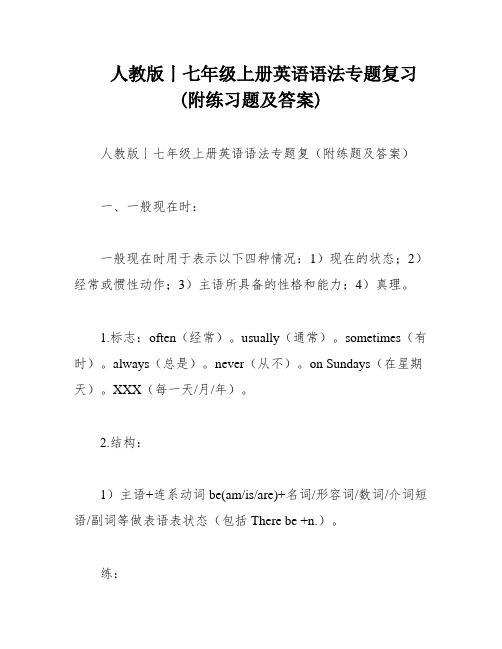
人教版丨七年级上册英语语法专题复习(附练习题及答案)人教版丨七年级上册英语语法专题复(附练题及答案)一、一般现在时:一般现在时用于表示以下四种情况:1)现在的状态;2)经常或惯性动作;3)主语所具备的性格和能力;4)真理。
1.标志:often(经常)。
usually(通常)。
sometimes(有时)。
always(总是)。
never(从不)。
on Sundays(在星期天)。
XXX(每一天/月/年)。
2.结构:1)主语+连系动词be(am/is/are)+名词/形容词/数词/介词短语/副词等做表语表状态(包括There be +n.)。
练:1.I am a student。
My name is Tom.2.Where are my shoes。
They are here.3.Who is the girl with long straight hair。
I think she is Kate.4.You and I are not in Class Six.5.XXX。
Yes。
there is.6.XXX。
No。
they aren't.2)主语(非第三人称单数)+行为动词原形+其他(用助动词do帮助构成否定句、一般疑问句和特殊疑问)。
3)主语(第三人称单数)+行为动词的第三人称单数+其他(用助动词does帮助构成否定句、一般疑问句和特殊疑问句)。
行为动词第三人称单数加-s的形式:1.-s2.辅音+y: study-studies3.以s,x,ch,sh结尾: watch-watches。
XXX4.特殊: have-has。
do-does。
go-goes。
练:1.His parents watch TV every night.肯定句:1.XXX.否定句:2.His parents do not watch TV every night.n: My brother does not do homework every day。
人教版七年级下册英语语法一般现在时教学课件

人称代词人称代词
人称代 词 I
与单相数应连的用 的用be于 代动指 替词名代人词某称 词;个代如(些: )我与复人(相数或们应连某)的,用个b你e(动些(词们)物), I am 她= I('m们),他w(e们),它we(a们re)=等we're
you you are 有= y单ou数're和复y数ou之分you are = you're
每周日 on Sundaeavleywnsiangys
Be动词
am 只和 I 连用 e.g. I am a girl.
is 与单数人称代词连用 e.g. He is my father.
are 与第二人称、复 数人称代词连用 e.g. They are students.
第一人称 第二人称
第三人称
一般现在时
The Simple Present Tense
He is Albert Einstein.
He is a great Scientist.
“ I like doing experiments and I read books and do experiments every day .”
否定结构:主语 + be (am, is, are) + not + 其他
is not = isn't are not = aren't I am not = I'm not
e.g. I am not a teacher. You aren't students. She isn't your mother志词
e频表ve率示ry副次系词数列的短语
频率由低到高
- 1、下载文档前请自行甄别文档内容的完整性,平台不提供额外的编辑、内容补充、找答案等附加服务。
- 2、"仅部分预览"的文档,不可在线预览部分如存在完整性等问题,可反馈申请退款(可完整预览的文档不适用该条件!)。
- 3、如文档侵犯您的权益,请联系客服反馈,我们会尽快为您处理(人工客服工作时间:9:00-18:30)。
I go to school at 8:00.九三管理局局直中学初一英语Unit 1
否定句:主语+don’t+动词原形I don’tgo to school at 8:00.
一、语法——一般现在时。
一般疑问句:Do +主语+动词原形一)一般现在时的用法:
1.表示习惯性的、现在反复出现的动作或状态:
I usually go to school at 7:00.我通常七点上学。
2.表示主语现在的状态和特征:
She often helps me.
3.表示客观事实或普遍真理:
The earth goes around the sun.地球绕着太阳转。
二)句子结构:
1.当谓语动词是实义动词,句子结构:主语+动词原形/动词单三
1)当主语不是第三人称单数,谓语动词是实义动词,
肯定句:主语+动词原形Doyou go to school at 8:00?肯定回答:Yes,主语
+do.Yes, I do.
否定回答:No,主语+don’t.No, I don’t.2)当主语是第三人称单数,谓语是实义动词,
肯定句:主语+动词单三She goesto school at 8:00.否定句:主语+doesn’t +动词原形She doesn’t goto school at 8:00.一般疑问句:Does +主语+动词原形Does she goto school at 8:00 ?肯定回答:Yes,主语+does.Yes, she does.否定回答:No,主语+doesn’t 否定回答:No,主语+don’t.No, she doesn’t.No, I am not.3)动词第三人称单数的变化规则:2)be动词的使用口诀:a.一般情况下,在词尾加-s:play-plays 我用am,你用are,is连着他她塔,单数isget- gets.
b.以s,x,sh,ch结尾的动词,在词尾加-es:watch- watches go- goes.
c.以辅音字母加y结尾的动词,要把y变成i,再加-es:fly- flies study- studies
2.当谓语动词是be动词,句子结构:主语+ be的适当形式
1)肯定句:主语+be (am/is are)I aman English teacher.
否定句:主语+be (m/is are)+not I am not an English teacher.
一般疑问句:Be(Is/Are)+主语Are you an English teacher?
肯定回答:Yes,主语+be(am/is/are).Yes, I am.复数are。
二、习题。
一)用be动词的适当形式填空。
1.I ____ a student. You ____ a teacher.
2.She _____ my friend.
3.____you Li Fen ? No, ____ not .
4.____ Mr. green very busy? Yes, he ____.
5.You and I____ good friends .
6.The girl in red clothes_____ my sister .二)将下列句子变成一般疑问句,并给出肯定及否定回答。
1. Simon and Daniel like going skating.
2. My parents watch TV every day.
3.Sun Yang and Sun Fang usually wash clothes on Saturdays.
4. Her classmates play football in school.
5.Gao Shan's sister likes playing table tennis.
6. My dog runs fast.
7.Mingming usually waters the flowers every day.
8. Tom does his homework at home.三)改错。
1.I goes to school at six every day.
2.He don’t like playing football.
3.They likes playing games.
4.Daming watchs TV in the evening.
5.Does he usually has a party?
6.What do they on Sunday?
7.Tony goes always to school at eight o’clock.
8.What they eat in the party?
9.Lily haves lunch at school.
10. What do his parents usually gives him ?四)句型转换。
1.I want to buy a big green bag . (变特殊疑问句)
______ ____ you want to buy?
2.Mary does not have any books .(变肯定句)
Mary _____ ______ books .
3.She likes the black bag. (变为否定句)
4.I buy the pants for only 50 Yuan. (用she改写句子)
______ ______ the pants for only 50 Yuan.
5.He often has hamburgers and apples for dinner . (变为一般疑问句)6.This is my pencil ? (变一般疑问句)____________ your pencil ?
7.These red socks are Kate's .(变一般疑问句)
___________ red socks Kate's ?
8.I want to buy a big green bag . (就划线部分提问)_____ _____ you want to buy ?
9.Mary does not have any books . (变肯定句)Mary _____ ______ books .
10. The clothing shop is on sale . (变为否定句)
11. She likes the black bag very much . (变为否定句)
12. I buy the pants for only 50 Yuan. (用she改写句子)She ____ the pants for only 50 Yuan.五)用所给动词的适当形式填空。
1.We often________(play)on the playground.
2.He _________(get) up at six o'clock.
3.__________you_________(brush)your teeth every morning.
4.What____ (do) he usually _____(do) after school?
5.Danny _______(study)English,Chinese,maths, Science and Art at school.
6.Mike sometimes __________(go)to the park with his sister.
7.At eight at night,she ________(watch)TV with his parents.
8.________Mike________(read)English every day?
9.How many lessons ______yourclassmate____(have) on Monday?10. What time ____his mother_________(do)the housework?
11. He often ______(have) dinner at home. 12.Daniel and Tommy___ (be) in Class
One.
12.People usually______(eat)dinner in the evening .
13.His sister usually_____(go)to school at 7:00 am .
14. Lin Tao_____ (like) his new sweater .
15. Let me _____(have) a look .
16. ____ he_____(like) English ?
17. I want_____ (go) to a movie .
18. He ____________ (not know)the teacher'sname .
19. Can I _____ (ask) the policeman ?
21. She likes______(play) chess .
22. The teacher teaches ______(listen).。
